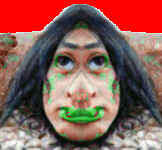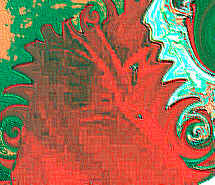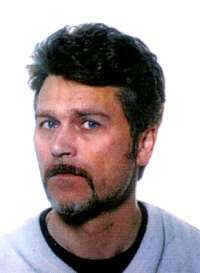 2002
Jihad Muhammad Musallam An-Natour, 24, Palestinian shot at 03:00
by Israeli troops as he was going from alley to alley in the in the Askar
refugee camp east of Nablus, West Bank, beating on a drum to announce the
approach of dawn, the start of the day's Ramadan fast, thus violating the
Israeli imposed curfew. The Reuters body count of the al-Aqsa intifada is
now “at least” 1681 Palestinians and 662 Israelis (not mentioning
a few foreigners, which are perhaps included in the numbers of the side
among which they happened to be). 2002
Jihad Muhammad Musallam An-Natour, 24, Palestinian shot at 03:00
by Israeli troops as he was going from alley to alley in the in the Askar
refugee camp east of Nablus, West Bank, beating on a drum to announce the
approach of dawn, the start of the day's Ramadan fast, thus violating the
Israeli imposed curfew. The Reuters body count of the al-Aqsa intifada is
now “at least” 1681 Palestinians and 662 Israelis (not mentioning
a few foreigners, which are perhaps included in the numbers of the side
among which they happened to be).
2001 Ulf Strömberg
[photo >], 42, by burglars in Taloqan, Afghanistan. He
was a cameraman for Sweden's
TV4. Two young masked men armed with Kalashnikov rifles break into the
house where a group of Swedish journalists is staying and take cameras,
computers, a satellite telephone and money from journalists working for
the newspaper Aftonbladet.The
bandits then move to the next room, where Strömberg was sleeping, knock
on the door, which Strömberg opens and immediately closes. They shoot
him through the door.
— TV4:s medarbetare,
nyhetsfotograf Ulf Strömberg, 42, har skjutits ihjäl vid ett rånöverfall
i Afghanistan. Han sköts i bröstet och avled kort därefter av skadorna på
väg till sjukhus i staden Taloqan i norra Afghanistan sent i på måndagskvällen.
— MORE (på svenska)
2001 Evison Matafale, 32, in police custody in Lilongwe,
Malawi, “for seditious letters to the president”. The cause of
death is given as “severe pneumonia”. The police had detained
Matafale, a reggae musician, a few days earlier while he was recovering
from a bout of malaria, and then severel beaten him.
2001
Ten Indian soldiers and eight islamic guerrillas of a group that
ambushed the Indian army patrol in Hari Buddha, a village in the district
of Poonch some 5 km from the ceasefire line dividing Kashmir between Indian
and Pakistani forces.
^
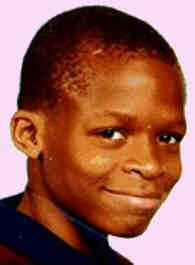 2000
Damilola Taylor [07 Dec 1989–]
[< photo], stabbed in the leg with a broken bottle
and left to bleed to death by indifferent passers-by, on his way home
from Oliver Goldsmith Primary School, in the North Peckham area of
south east London. 2000
Damilola Taylor [07 Dec 1989–]
[< photo], stabbed in the leg with a broken bottle
and left to bleed to death by indifferent passers-by, on his way home
from Oliver Goldsmith Primary School, in the North Peckham area of
south east London.
Four teen-agers
would be charged on 26 Jun 2001 with murdering Damilola, a crime that
provoked nationwide soul-searching about the safety of Britain's inner
cities. Damilola
Taylor bled to death from stab wounds in the stairwell of a run-down
housing project near his south London home as he tried to reach help.
The youths charged — Danny Preddie, 14, Ricky Preddie, 15, another
15-year-old, and Hassan Jihad, 16 — were arrested. All four boys,
who at the time were below the age (18) to be identified, had previously
been interviewed by police and had criminal antecedents.
No
possible motive for the attack has been reported. One of the youths
is of African origin, one is of mixed race and two are of Mediterranean
origin.
Damilola had come to
Britain from Nigeria three months earlier with his family so his sister
could seek treatment for severe epilepsy. He had complained about
being teased at school for his African accent. While many Britons
initially said he was a victim of bullying, others blamed the dilapidated
living conditions that many immigrants endure in Britain's inner cities
(as in other wealthy countries). Damilola lived with his family in
a crime-ridden project. Damilola was stabbed in his left leg either
by a shard of glass or a knife as he walked home. The schoolboy left
a 100-meter-long trail of blood before collapsing in the concrete
stairwell, five minutes from his front door. Witnesses reported seeing
several youths running from the scene. After Damilola's death attracted
nationwide publicity, police and politicians canvassed his neighborhood,
trying to convince often reluctant residents to cooperate with detectives.
The four suspects had been identified as early as December 2000, but
police needed to gather more evidence before bringing charges. They
would be brought to trial in February 2002 and acquitted for lack
of sufficient evidence, the last two, brothers both 16 by then, on
25 April 2002. The defense claimed that Damilola had fallen on a broken
bottle. A second trial (23 Jan 2006 - 04 Apr 2006) would clear Jihad
and fail to convict the Preddies. At the end of a third trial started
on 23 June 2006, the brothers Ricky Preddie, 19, and Danny Preddie,
18, are convicted of manslaughter (but not murder) on 09 August 2006.
—(060809) |
1998 Gloria Fuertes, escritora española.
1994
Carlos Lleras Restrepo, presidente de la República española.
1989: 107 persons as a bomb blamed by police on
drug traffickers destroys a Colombian jetliner.
1989 Carlos
Arias Navarro, presidente del Gobierno español.
1985
Fernand Paul Braudel, historiador francés.
1983:
185 in crash of Colombian Avianca Airlines Boeing 747 near Madrid's
Barajas airport.
1983 Federico Carlos Sáinz de Robles y Correa,
escritor español.
1984 Percy Norris deputy high
commissioner of India, shot dead
1980 (Thanksgiving Day) Seven
persons when Priscilla Ford, 51, drives her Lincoln Continental
down a crowded sidewalk in Reno, Nevada. 21 persons are injured. Priscilla
Ford would be sentenced to death, but her execution would be delayed by
several appeals and she would die of emphysema in prison on 23 January 2005.
^
1978 George Moscone, and Harvey Milk,
Mayor and City Supervisor of San Francisco, shot by ex-Supervisor
At approximately 11:00, former City
Supervisor Dan
White [02 Sep 1946 – 21 Oct 1985] enters San Francisco City
Hall through an open basement window to avoid the building's metal
detectors, walks into the office of San Francisco Mayor George
Moscone [24 Nov 1924–] and shoots him to death. In the ensuing
commotion, White escapes down the corridors to the city supervisors's
offices at the other end of the building, asks to speak to Supervisor
Harvey
Milk [22 May 1930–], in private for a few minutes, and then
shoots him to death as well. Dan White, an ex-policeman and ex-fireman,
was elected as supervisor in the heavily conservative Irish-Catholic
working-class neighborhood known as District 8. White promised to
restore traditional values to San Francisco city government and rid
the city of radicals and social deviates. To White, Democrat George
Moscone, San Francisco's liberal mayor, and Supervisor Harvey Milk,
the first openly homosexual politician to be elected to an important
local office in the US, were two such individuals.
Before becoming mayor on 08 Jan 1976, Moscone served as a California
state senator, and was instrumental in securing the passage of the
state's homosexual rights bill, which protected the privacy of two
consenting adults. As mayor, Moscone proposed liberal initiatives
and sought to redress the grievances of Black police officers who
had been passed over for promotions on account of their race. On the
eleven-member board of supervisors, White sat alongside Supervisor
Harvey Milk, elected from the predominantly gay area of San Francisco
known as "The Castro." On 10 November 1978, White resigned as supervisor,
fed up with the liberal mayor and his supporters on the board. The
other five conservatives on the board, fearing a liberal majority,
begged White to take back his resignation. When Mayor Moscone refused
to entertain the possibility, White went into a rage, murdering Moscone
and Milk on 27 November. At the trial of Dan White, White's attorney
employed the so-called "twinkie defense," arguing that too much junk
food affected White's reasoning abilities. The prosecution never introduced
White's politics or homophobia into the trial, and the jury found
White guilty of voluntary manslaughter. White's light sentence of
seven years outraged many San Franciscans, and on 21 May 1979, demonstrations
at City Hall on the eve of what would have been Milk's forty-ninth
birthday erupted into riots. Dan White was paroled from Soledad Prison
on 06 January 1985, after serving only five years and one month in
prison for the murders of two men.
White, who storms into San Francisco's government offices with a .38
revolver, had reportedly been angry about Moscone's decision not to
reappoint him to the city board. Firing upon the mayor first, White
then reloaded his pistol and turned his gun on his rival Milk, who
was one of the nation's first openly gay politicians and a much-admired
activist in San Francisco. Future California Senator and then-Supervisor
Dianne Feinstein, who was the first to find Milk's body, found herself
addressing a stunned crowd at City Hall. "As president of the Board
of Supervisors, it's my duty to make this announcement: Both Mayor
Moscone and Supervisor Harvey Milk have been shot and killed. The
suspect is supervisor Dan White." White, who was caught soon after
the murders, pleaded a "diminished capacity" defense, claiming that
copious amounts of junk food, combined with distress over the loss
of his job, caused him to suffer mental problems. The so-called "Twinkie
Defense" appeared to be successful, and, in 1979, White was found
guilty of voluntary manslaughter rather than murder. Public outrage
was so widespread that California revoked the diminished capacity
defense in subsequent cases.
Following the murders, both riots and peaceful candlelight demonstrations
took place as the city of San Francisco publicly mourned the loss
of two of its most cherished and respected civic leaders. Time has
not diminished the impact of the loss: in 1998, more than 6000 people
marched through the streets of San Francisco to remind residents not
to forget the atrocity. For his crime, White received a five-year
prison sentence. After his release, he was unable to resume a normal
life, and he took his own life by sitting in his car with the engine
running and a hose in the back seat connected to the exhaust. |
1975 Ross McWhirter Guinness Book of Records keeper, murdered
1971 Francisco Javier Sánchez Cantón, historiador
de arte español.
1958 Lucy Elizabeth Kemp-Welch,
British painter specialized in horses, born on 20 June 1869. — MORE
ON KEMP~WELCH AT ART “4” NOVEMBER
with links to images.
1955 Arthur Honegger, French
composer born on 10 March 1892.
^
1953 Eugene O'Neill, playwright, in
Boston
Born on 16 October 1888, O'Neil
was one the most influential American artists of the twentieth century.
When, on 03 November 1916, nhe experimental Playwrights'
Theater opened its first New York season, one of the three short
plays it featured was the one-act Bound East for Cardiff,
by then unknown O'Neill.
O'Neill,
who wrote more than twenty full-length plays over the course of the
next two decades, is credited with transforming American theater into
a literary medium which, in its artistry, rivaled the best in US fiction
and painting. He won four Pulitzer Prizes for his plays and remains
the only US playwright to have received the Nobel Prize in Literature.
The Swedish Academy awarded the 1936 Nobel Prize in Literature to
O'Neill “for the power, honesty and deep-felt emotions of his
dramatic works, which embody an original concept of tragedy”—
MORE
O'NEILL ONLINE: Beyond
the Horizon, The
Hairy Ape |
1950 All members of a US task force. annihilated in Korea,
east of the Chosin River, by Chinese forces.
1945 Josep María
Sert i Badía, Catalan painter born on 21 December 1874.
— MORE
ON SERT AT ART “4” NOVEMBER
with links to images.
1942 The French fleet in Toulon
is scuttled to keep it from Germany (and not to give it to the British).
1934 Baby Face Nelson shot by FBI agents
1927
(25 Nov?) József Rippl-Rónai, Hungarian painter, printmaker, pastellist,
ceramicist, and designer, born on 23 May 1861. — more
1925 Roger de la Fresnaye, French Cubist-Fauvist painter
born on 11 July 1885. — MORE
ON DE LA FRESNAYE AT ART “4” NOVEMBER
with links to images.
1909 Luis A. Martínez, escritor
y político ecuatoriano, considerado predecesor remoto de la novela social
de su país. Nació el 25 Jun 1869.
1904 Paul
Tannery, mathematician
1900 Anton Seitz,
German artist born on 23 January 1829.
^
1895 Alexandre Dumas fils,
French playwright and novelist, born on 27 July 1824. He was one of
the founders of the “problem play” (middle-class realistic drama treating
some contemporary ill and offering suggestions for its remedy).
Dumas fils, the illegitimate son of
Alexandre Dumas père [24 Jul 1802 – 05 Dec 1870], possessed
a good measure of his father'sliterary fecundity, but the work of
the two men could scarcely be more different. His first success was
a novel, La Dame aux camélias (1848), but he found his vocation
when he adapted the story into a play, known in English as Camille,
first performed in 1852. (Giuseppe Verdi based his 1853 opera La
Traviata on this play.)
Although
his father had written colorful historical plays and novels, Dumas
fils specialized in drama set in the present. The unhappy witness
of the ruin brought on his father by illicit love affairs, Dumas fils
devoted his plays to sermons on the sanctity of the family and of
marriage; Le Demi-Monde (1855), for example, dealt with the
threat to the institution of marriage posed by prostitutes. Modern
audiences usually find Dumas's drama verbose and sententious, but
in the late 19th century eminent critics praised his plays for their
moral seriousness. He was admitted to the French Academy in 1875.
Among his most interesting plays are Le Fils naturel (1858)
and Un Père prodigue (1859), a dramatization of Dumas's interpretation
of his father's character.
FILS DUMAS ONLINE:
En Français: La
Dame aux Camélias + L'Ami
des Femmes + Le
Fils naturel (1858) + Tristan
le Roux
La
boîte d'argent + Un
Paquet de lettres + Le
Prix de Pigeons +
Le Pendu de la Piroche + Ce
que l'on voit tous les jours + Césarine
— In English translation: Camille
(La Dame Aux Camélias) |
1894 Charles Burton Barber, British artist born in 1845.
1889 Nicolaas Riegen, Dutch artist born on 31 May 1827.
1870 El general Juan Prim y Prats, asesinado a la
salida del Congreso español.
1862 Armand Julien Pallière,
French artist born in 1784.
1887 US Deputy Marshall Frank
Dalton, brother of the three famous outlaws, is killed in the line
of duty near Fort Smith, Ark.
^
1868 Chief Black Kettle and 102 other peaceful Cheyennes,
mostly women and children, massacred by Custer.
Without bothering to identify the village
or do any reconnaissance, Lieutenant Colonel George Armstrong Custer
[05 Dec 1839 – 25 Jun 1876] leads his 7th Cavalry in an early
morning attack on a band of peaceful Cheyenne living by the Washita
River with Chief Black Kettle, who had survived the infamous 29 November
1864 Sand Creek Massacre, and
still remained peaceful.
Custer
had been convicted of desertion and mistreatment of soldiers earlier
that year in a military court. The government had suspended Custer
from rank and command for one year. Ten months into his punishment,
in September 1868, General Philip Sheridan [06 Mar 1831 – 05
Aug 1888] reinstated Custer to lead a campaign against Cheyenne Indians
who had been making raids in Kansas and Oklahoma that summer. Sheridan
was frustrated by the inability of his other officers to find and
engage the enemy, and despite his poor record and unpopularity with
the men of the 7th Cavalry, Custer was a good fighter. Sheridan determined
that a campaign in winter might prove more effective, since the Indians
could be caught off guard while in their permanent camps.
On 26 November, Custer located a large village of Cheyenne encamped
near the Washita River, just outside of present-day Cheyenne, Oklahoma.
Custer did not attempt to identify which group of Cheyenne was in
the village, or to make even a cursory reconnaissance of the situation.
Had he done so, Custer would have discovered that they were peaceful
people and the village was on reservation soil, where the commander
of Fort Cobb had guaranteed them safety. There was even a white flag
flying from one of the main dwellings, indicating that the tribe was
actively avoiding conflict.
Having surrounded the village the night before, at dawn Custer called
for the regimental band to play "Garry Owen," which signaled for four
columns of soldiers to charge into the sleeping village. Outnumbered
and caught unaware, scores of Cheyenne were killed in the first 15
minutes of the "battle," though a small number of the warriors managed
to escape to the trees and return fire. Within a few hours, the village
was destroyed. The soldiers had killed 103 Cheyenne, including the
peaceful Black Kettle and many women and children. Hailed as the first
substantial US victory in the Indian wars, the Battle of the Washita
helped to restore Custer's reputation and succeeded in persuading
many Cheyenne to move to the reservation. However, Custer's habit
of boldly charging Indian encampments of unknown strength would eventually
lead him to his well-deserved death at Little Bighorn. |
1852 Ada
Lovelace, mathematician
1836 Antoine Charles
Horace “Charlot” Vernet, French painter born on 14 August
1758. — MORE
ON VERNET AT ART “4” AUGUST
with links to images.
1833 Philip Reinagle, English
painter born in 1749. — MORE
ON REINAGLE AT ART “4” NOVEMBER
with links to images.
1811 Gaspar Melchor de Jovellanos,
born on 05 January 1744, Spanish patriot statesman and author, one of the
most important figures of the 18th-century Spanish Enlightenment.
1796 Karl-Sébastien von Bemmel, German artist born
on 01 April 1743.
1754 Abraham
de Moivre, mathematician.
1680 Athanasius Kircher,
in Rome, German Jesuit born on 02 May 1601 in Thuringia, “the last
Renaissance man” and/or “the first Postmodernist”. Amazing.
—
MORE ON KIRCHER.
1673 Anthonie Stevers,
Stevaerts Palamedes, Dutch artist born in 1601.
1670
Jacob van Loo, Flemish artist born in 1614. — more
1654 Pieter Meulener (or Meulenaer, Molenaer), Dutch artist
born on 18 February 1602.
^
1382 Philip van Artevelde and others at the battle
of Rosebeke
The
French nobility, led by Olivier de Clisson, crush the Flemish rebels.
— Olivier de Clisson écrase les insurgés flamands à Rosebeke,
près d'Ypres. Les tisserands de Gand et des autres villes de Flandre
étaient en révolte contre leur comte depuis plusieurs décennies en
raison de la guerre de Cent Ans qui mettait en péril leur fructueux
commerce avec l'Angleterre. Le chef des insurgés, Philip van Artevelde,
trouve la mort dans le combat. Le roi de France Charles VI restitue
son vassal, Louis II de Male, dans ses droits légitimes sur le comté
de Flandre avant que celui-ci ne tombe dans l'héritage du duc de Bourgogne
puis des Habsbourg. |
0511 Clovis, king of the Franks, his kingdom is divided
between his four sons. — Clovis meurt en ouvrant la voie à plusieurs
dynasties de rois mérovingiens qui dureront, cahin-caha, deux siècles et
demi. — Décès de Clovis. On l'inhume dans la basilique des Saints-Apôtres
à Paris. Sa femme Clotilde se retire dans un monastère à Tours. Son royaume
est divisé entre ses quatre fils, Thierry, Childebert, Clodomir et Clotaire.
^
— 8 -BC- Quintus Horatius Flaccus (Horace),
57, Latin poet and satirist
His Satires are 10 poems written in hexameter verse and
published in 35 BC. The Satires drew on Greek roots, stating Horace's
rejection of public life firmly and aiming at wisdom through serenity.
He discusses ethical questions: the race for wealth and position,
the folly of extremes, the desirability of mutual forbearance, and
the evils of ambition.
In his
17 Epodes mockery is almost fierce, the metre being that
traditionally used for personal attacks and ridicule, though Horace
attacks social abuses, not individuals. Horace published his Epodes
and a second book of eight Satires in 30-29 BC
Horace
published three books of Odes, 88 short poems, in 23 BC.
Horace, in the Odes, represented himself as heir to earlier Greek
lyric poets but displayed a sensitive, economical mastery of words
all his own, about love, wine, nature, of friends, of moderation.
He also wrote epistles (Book
I was published 20-19 BC) — literary "letters" that were more
mature and profound versions of the Satires — abandoning "frivolous"
lyric poetry for a more moralistic kind of verse. In three further
epistles (much longer than any in the first book), relating to poetic
activities, Horace abandoned all satirical elements for a sensible,
gently ironical stance, praising moderation. Two epistles make up
a second book, and the third, the Epistle to the Pisos, was
also known, at least subsequently, as the Ars poetica. These last
three epistles embody literary criticism in a loose, conversational
frame. The Epistle to Florus (Book II, Epistle 2) explains
why Horace abandoned lyric poetry for "philosophy." The best poems,
Horace says, edify as well as delight; the secret of good writing
is wisdom (implying goodness); the poet needs teaching and training
to give of his best. The "Epistle to Florus" may have been written
in 19 BC, the Ars poetica (consisting of nearly 30 maxims for young
poets' guidance) in c. 19-18 BC, and Book I's last epistle, dedicated
to Augustus,in 17-15 BC. In the last epistle contemporary poetry is
asserted against Rome's earlier literary background.
In
17 BC Horace composed in a lyric metre the Carmen saeculare
for ancient ceremonies called the Secular Games, which Augustus had
revived to provide a religious sanction for his moral reforms of the
previous year. Horace next completed a fourth book of 15 Odes, mainly
of a more serious and political character than their predecessors.
The latest of these poems belongs to 13 BC.
— - Mort du poète Horace à Rome. Il a dans sa jeunesse
servi comme officier dans l'armée de Brutus.. Il deviendra pourtant
plus tard favori de l'Empereur Auguste.. Son ami. Virgile le présente
à Mécène., grand protecteur des artistes, dont il devient le protégé.
Les Odes d'Horace. restent à jamais immortelles, mais ce poète délicat
et plein d'esprit a également composés des Satires et Épitres, dont
l'une constitue ce qu'on appellera plus tard " L'Art Poétique"
HORACE ONLINE: |
| in the original Latin:
Carmina
De
Arte Poetica
Satyrarum
libri |
in English translations:
The
Works of Horace
The
Art of Poetry: To the Pisos
Odes |
|
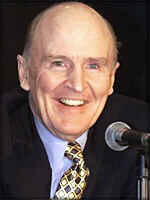 2000
New CEO picked at GE
2000
New CEO picked at GE  2002
Jihad Muhammad Musallam An-Natour, 24, Palestinian shot at 03:00
by Israeli troops as he was going from alley to alley in the in the Askar
refugee camp east of Nablus, West Bank, beating on a drum to announce the
approach of dawn, the start of the day's Ramadan fast, thus violating the
Israeli imposed curfew. The Reuters body count of the al-Aqsa intifada is
now “at least” 1681 Palestinians and 662 Israelis (not mentioning
a few foreigners, which are perhaps included in the numbers of the side
among which they happened to be).
2002
Jihad Muhammad Musallam An-Natour, 24, Palestinian shot at 03:00
by Israeli troops as he was going from alley to alley in the in the Askar
refugee camp east of Nablus, West Bank, beating on a drum to announce the
approach of dawn, the start of the day's Ramadan fast, thus violating the
Israeli imposed curfew. The Reuters body count of the al-Aqsa intifada is
now “at least” 1681 Palestinians and 662 Israelis (not mentioning
a few foreigners, which are perhaps included in the numbers of the side
among which they happened to be). 2000
2000
